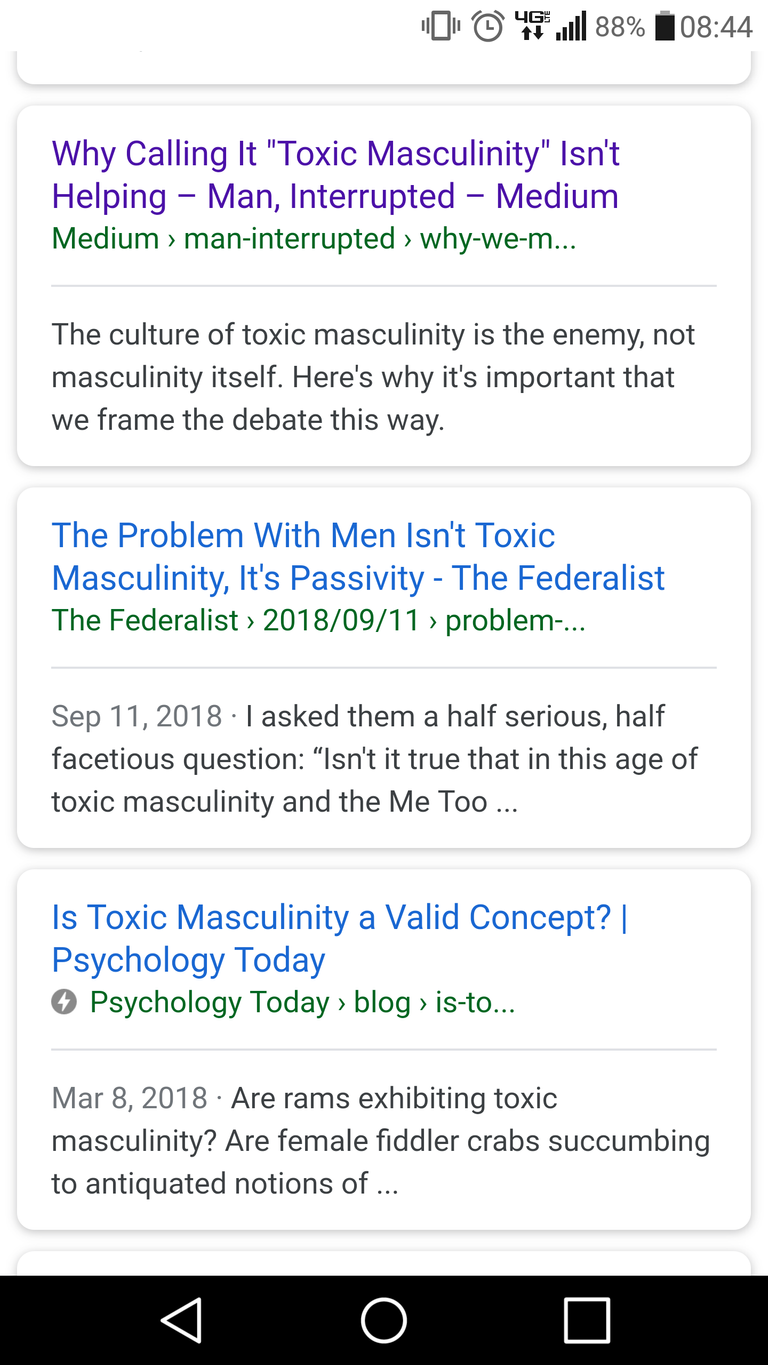
A well articled subject...
Buzzwords are notorious for having hard to pin down definitions.
Definitions of buzzwords are frequently dependent on the social or political persuasion of the individual being asked. This is why I tend to avoid them, they are imprecise and often meaningless to a real search for truth.
One such buzzword (buzzphrase?) getting a ton of use lately is “Toxic Masculinity” (“TM” for brevity).
I have seen “TM” used by hard core feminists and not so hard core feminists alike. “TM” gets blamed for everything from manspreading to mass shootings.
Basically anything that men do in quantifiable measures more than women can be reduced to “toxic masculinity” depending on who you talk to.
I am a fan of one definition I found. This is the definition that describes toxic masculinity as a cultural push to make men into “manly men”.
In “TM” culture, men are supposed to be hyper-sexual, hyper-aggressive, unemotional, aloof, and unable to nuture or show compassion. Any man who is not “manly” on these terms is a “cuck” or any number of other derogatory terms. I have no problem opposing that kind of “toxic masculinity”.
It is destructive to men and women to define men in such terms.
It’s not just the culture at large where we see this push. The concept of “wild” men is quite prevalent in the church as well. Men are supposed to be “wild at heart” and their wives should not seek to “tame” (ie emasculate) them by insisting on their emotional availability. Men are supposed to be strong and quiet and never let their wives see them as weak or insecure (ie human). Godly men don’t need to be corrected by their wives, that would undermine his role as strong leader. He is to be left to his own devices, after all, God did make him strong for a reason.
This kind of “masculinity” is just as repugnant as the world’s view of men as womanizers and aggressors. But, as one article points out, it’s a culture, not a real masculinity. The problem is not masculinity itself, but the way we have defined it.
Frequently I see “toxic masculinity” used whenever any injustice (real or perceived) against women occurs. By this definition “toxic masculinity” is at play even when something as simple as a book without a strong female character is in question (or if that character is a “strong female“) .
If women aren’t proportionately represented in a particular job class, it’s probably the fault of “toxic masculinity”. If a man rapes a woman, he must have been raised in “toxic masculinity”. In the mind of many of the hyper-feminists out there, it seems like nothing ever happens apart from it.
Could it, in the definition I appreciate, be at play in any and all of these things? Maybe. But always? And to the point where every time a disproportionate hiring or a rape or a mass shooting occurs we need to automatically place it in the “guilty” category?
I don’t think so. Nailing down why a bad thing happens in this world is hardly ever simple, labeling it with a buzzword to raise “awareness” (another buzzword) is not going to stop it from happening again.
I also have seen “toxic masculinity” blamed when any gendering of a person takes place. If you call a girl “pretty” or a boy “handsome” or “strong” without correcting your speech to say boys can be pretty or girls strong you are guilty of a pernicious crime. In this view any promotion of gender differences is automatically supporting “toxic masculinity.”
Gender differences do exist. The problem is not that genders exist, the problem is that we gender things. We gender colors, blue is a boy color, pink is for girls. We gender toys, dolls are for girls, cars are for boys. We gender personalities, females are nurturing, males are rough and aggressive.
It is not the fault of toxic masculinity that boys can’t like pink and play gently with dolls. It’s the fault of a culture that likes efficiency in distinction. “Boys are boys and do these boy things. Girls are girls and do these girl things.” Our culture likes cut and dry distinctions, anything outside of the norms makes it uncomfortable.
I think this is also why buzz words and catch all phrases gain such traction. It is easier to blame a concept of “Toxic Masculinity” when men do horrible things than it is to dissect individual factors.
I have a hard time adopting phrases that get adopted by the uber political class. They water down and change meanings all the time to fit their needs. Words and phrases get overused and misused and no one can quite pin down exactly what is being communicated.
Words have meaning, and words without meaning have no place in rational discourse.
If you like my blogs/paintings/photography, please upvote and follow! And check out my Wordpress pages @ https://driptorchstudio.wordpress.com
https://www.driptorchpress.com
And my Artpal page @ https://www.artpal.com/driptorchstudio

I enjoy your rationale! I think that a balance between everyones femininity and masculinity is ideal. I suppose we all have both within us, both sacred, both important. I value the rational and strength of my boyfriend, and still hold him when he cries. And he enjoys the flowery and artistic feminism within me, and still spars with me when I want to. It is a balancing act! Neither can be without the other. I am constantly astounded at the irrationality of many 'feminists' who try and confuse the whole thng or shove it into a box.
Replace “culture” and “we” with “women” and you get closer to the truth.
Women decide who to have sex with. Women decide who the father of there children will be. Because of this men will thrive to be whatever women want them to be.